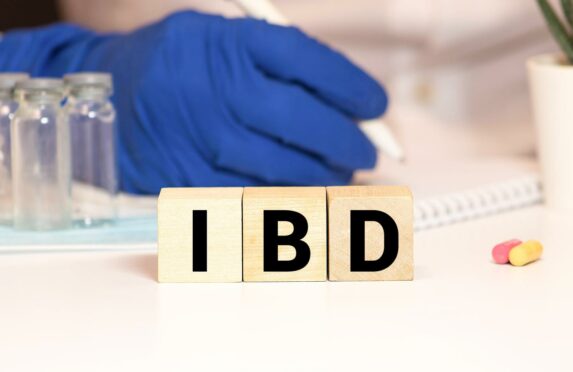While enduring daily injections to treat her symptoms, an Inverurie mum-to-be has opened up about her chronic health battle, and trying to make her first pregnancy as “magical” as possible.
Megan Georgopoulos, 31, from Inverurie, was diagnosed with ulcerative colitis when she was 13.
The life-long condition causes sores and inflammation in the gut, leaving patients in debilitating pain, and even passing blood and pus.
The journey to Megan’s diagnosis wasn’t easy, and she recalls being in and out of Royal Aberdeen Children’s Hospital for years before finally finding a treatment plan that works.
Kitchen designer Megan is now expecting her first baby and, while she’s excited about the upcoming due date, it hasn’t come without its trials.
‘If I’m feeling miserable, I’m going to let you know’
Despite this, she’s determined not to shy away from the issues she’s facing.
Sometimes her flare-ups have meant that she’d have to sit out on social events, but having a strong group of friends who understand why has made all the difference.
She added: “I know what it’s like, and it’s easier for me to speak about it and help other people understand it.
“Rather than to just be like: ‘well, I’m not going to say anything because I’m too embarrassed.’
“If I’m feeling miserable, I’m going to let you know.”
For the last 12 years, Megan has been using steroids to treat her flare-ups. They can help to quickly reduce the inflammation in your gut and make her feel better.
“The main side effects for me are that I get quite a lot of incontinence. I lose a significant amount of blood when I’m flared up,” she said.
“I can be going the bathroom anywhere between 10 to 20 times a day. I could be running back and forth, and it’s really bad.”
Megan emphasised the importance of opening up and said it gets easier when you get older – and joked that you become more organised about knowing where the nearest toilets are.
“I think as an adult that’s kind of transitioned into me being very organised and knowing where every single bathroom is,” she added.
“If I need to go on a walk, even if it’s in Inverurie or if it’s an Aberdeen, I know where the nearest bathroom is if I need to stop and go.”
Megan’s guilt juggling colitis and pregnancy
For the six months of her pregnancy so far, Megan has suffered regular colitis flare-ups.
It’s proven hard for her, not just because of the physical toll, but mentally as well, as she attempts to juggle the pressures of expecting a child with her chronic disease.
She explained: “At the start, I was like: ‘No, I’m going to eat really healthily’.
“It’s been really difficult because one of the things you’re actually not supposed to do when you’ve got colitis is eat a lot of fruit and vegetables.
“It slows down your digestive system and kind of clogs it up as it’s harder for your stomach to break down the enzymes, particularly raw fruits and veg.
“What happens? I ended up with a flare-up – and back on steroids.
“The period of first being on them and feeling really guilty for having to be on quite serious drugs during my pregnancy, and also like not being allowed to have a lot of fruit and veg because it was making the situation worse.
“I feel like there was quite a lot of guilt, to be honest.”
Daily injections amid fears of complications
In addition, when Megan first found out she was pregnant, she was told that she would have to endure daily injections as she carried her child.
Every day she has to self-administer a blood thinner, as people with colitis are more likely to suffer blood clots during pregnancy.
“I just remember thinking ‘This is so unfair,” Megan added.
“I want this to be a magical thing and have like a great time and a lovely pregnancy.

“Apart from having flare-ups, I’ve had a great pregnancy. So, that’s been good.
“But just the idea of having to inject yourself every single day – that can be quite hard.”
‘It gets easier over time’
Megan is appealing for others to open up about their condition, rather than suffer in silence.
She added: “I know it can be difficult to first start speaking about it, but it gets easier over time.
“You realise that the more people you have around you, that you can speak to about it and will be supportive about it, the easier it’s going to make things for you.
“You’re not going to have to explain why you’re running to your bathroom, why you’re disappearing, or leaving in the middle of a conversation.”
And Megan says the more people talk about what colitis is and how it affects people, the better understanding there’s going to be.
“There’s going to be more general knowledge about it, and it’s going to spread awareness through that,” she added.

She also felt less alone hearing stories from the Crohn’s and Colitis Aberdeen group, and said online forums have been a “massive help” – including throughout her pregnancy.
“I think you just learn to live with it as an adult. It becomes something you get used to.
“You work with your consultants and your nurses to develop a route of treatment and a plan that makes it sort of liveable for you.
“Obviously, there’s no cure for it, but it makes it liveable.”
For more information, support and resources visit Crohn’s & Colitis UK or call the UK helpline on 0300 2225700.


